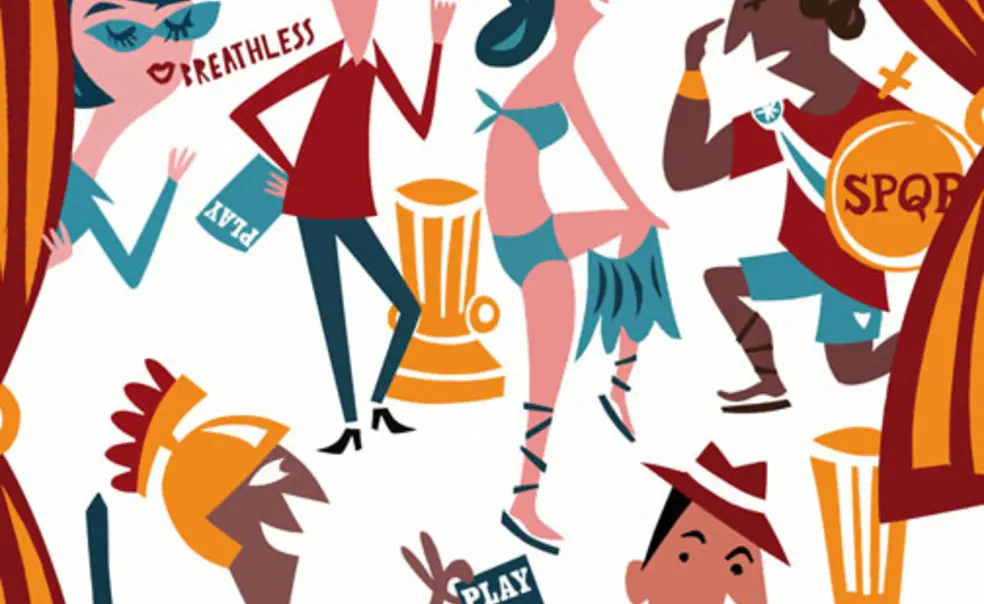Freelance writer Merrell Noden ’78 is a frequent PAW contributor.
I was a little boy when I saw my first play by Shakespeare. It was Macbeth, at McCarter Theatre in Princeton, and family legend has it that just before the lights went down, I asked rather too loudly if the group of nuns sitting nearby were the witches.
Since then, I’ve read his plays over and over, even entertaining myself by memorizing passages to recite on long drives. I’ve also taught Shakespeare, most recently to inmates at the New Jersey State Prison, in Trenton. Last fall, with Othello, Hamlet, and Macbeth behind us and a momentous election coming up, one of my students at the prison suggested we read Julius Caesar, which of course is not about an orderly transfer of power but its opposite, a bloody assassination. My co-teacher and I fretted about how the play would go over with the men, but it turned out we had nothing to worry about: They had no trouble finding echoes of their own lives in manipulative Cassius and vengeful Anthony.
So when I saw a poster on campus announcing auditions for a Princeton Shakespeare Company production of the play, I took it as an omen, of which there are many in Julius Caesar. It was time to take my private recitations public. I auditioned, and when parts were announced, I was pleasantly surprised to see that I was to play Cicero. Maybe it was Trebonius’ line about Cicero’s “silver hairs” that got me the part, since I was the only non-student in the cast. In our script Cicero had only eight lines, in three short speeches. But as I would learn, that was more than enough for a novice who had spoken exactly one line on stage in his entire life, in a high school production of Finian’s Rainbow 37 years earlier.
For weeks, I was a machine that recited those eight lines everywhere I went. My 10-year-old son knew them perfectly after about a week, just from hearing me run through them. I quickly came to appreciate how much Shakespeare gives you to work with. The slightest of hesitations, the rise and fall of one’s voice, can convey such different things. To harness all of a speech’s rich meaning is as challenging as singing.
Andy Linz ’11, our director, was a sophomore from San Diego and very bright and witty. It can’t be easy managing 18 of your peers, but Andy was good at giving them slack and then reeling them back in when necessary. He seemed to have a photographic memory for where everyone should be at any instant, as well as an absurdist imagination that reminded me of Monty Python. When Dylan Alban ’09 made an entrance with his head bobbing oddly, Andy told him, “You’ve got this weird, back and forth, binary hamster thing going on.” Perhaps Andy’s smartest choice was deciding not to do the play in togas since, as he told us, it’s darn hard, after Animal House, to get people on a college campus to take men in togas seriously.
In a cast in which everyone else was a Princeton student and less than half my age, I felt like an interloper or a generational spy. Would the students think of me as someone hoping that some of their youth would rub off on him, or as someone trying to relive past glories (which I knew did not exist)? As it turned out, they could not have been nicer. It may say something about my own maturity level that they accepted me so easily. At rehearsal’s end, the students would go off to their rooms and I’d go home to my family. But at the cast party held in a Spelman quad very close to my senior-year room, we played a game of Truth or Dare (Have you ever spent time in jail? Yes, after an anti-Klan demonstration). I won two straight rounds.
I was impressed by how much the students managed to cram into their lives along with the Shakespeare. Our Cassius, Julia Keimach ’12, would come to rehearsal directly from rowing practice, sometimes with a large bag of ice to numb sore ribs that turned out to be broken. Our mighty Caesar, a muscular extrovert named Jordan Bubin ’09, would come offstage and read for his politics thesis on speech and property. Others would leave editions of Borges, Kundera, and Kant lying open backstage, waiting to be picked up the moment their owners came off stage. Very quickly I began leaving my murder mystery at home and coming to rehearsal with a copy of Machiavelli. When in Rome ...
I was struck by the students’ ease with one another. Men and women seemed very comfortable together, even changing side by side in the crowded dressing room. Jokes and mock insults filled the air. Among the many things I learned was what it means to be “sexiled.” Rather, I learned the meaning of the word “sexiled” — to be banished from your room because your roommate and a friend required privacy.
The most experienced actor of the bunch probably was Matt Prast, a freshman from Orlando who was playing Mark Antony. Matt had begun acting in sixth grade. When I asked him if he’d done any Shakespeare before, he reeled off a long list of plays. Richard III he’d done twice! All that experience showed. Through the curtain I’d listen as Matt played with volume, bringing his voice down to a whisper when he first sees Caesar’s bloody corpse, then raising it to an angry shout when threatening to “let slip the dogs of war.”
I loved every minute of it — except for the 10 minutes or so I was on stage. That was nothing short of terrifying. I’d been guessing all along that for me the hardest part would be standing still and listening to Josh Zeitlin ’11 run through Casca’s long list of the weird things that have been happening in Rome. And I was right. On opening night I could feel my knees trembling as I waited for Josh to reach the words “send destruction,” which was my cue to start my second little speech. I worried about going blank or even fainting, literally. In my suit, I felt incredibly hot under the lights. P.J. Miller ’10, who played Brutus, had told me he’d passed out once in the middle of a play on a hot summer’s night. I’m not sure whether that was comforting or proof my fears actually could come to pass.













No responses yet